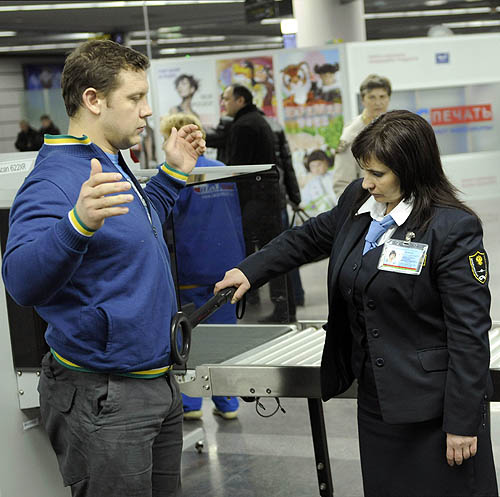|
 |
|
STRENGTHENED SECURITY: A guard uses a metal detector on a passenger at a security checkpoint at the Sochi International Airport on January 25 (XINHUA/AFP) |
Although Kremlin spent a decade destroying the main forces of separatist militants in Chechnya and, afterward, pushed for post-war reconstruction, Chechens never outgrew their hatred for Russians. Owing to historical conflicts, anti-Russian fervor has in fact remained deeply rooted in the hearts of many Chechens. Indeed, these emotions were only strengthened by the devastation caused by the two Chechen wars from 1994 to 1996 and from 1999 to 2009.
People in North Caucasus share similar cultural and religious backgrounds. In addition, they enjoy close social relations with each other. Although they long for stability and peace, many of them are also sympathetic to separatists.
Armed suppression is an important means of combating terrorism, but it is not the only means, nor can it effectively address ethnic conflicts. To root out terrorism, the Russian Government must work harder to eliminate the psychological barriers that exist between Chechens and Russians while trying to improve local people's living standards.
Long beset by war, economic stagnation and rampant government corruption, North Caucasus is a breeding ground for separatists. The unemployment rates in Ingushetia, Chechnya and Dagestan are 50 percent, 30 percent and 20 percent, respectively. Furthermore, corruption among government officials has prevented funds allocated by the Russian Federal Government for local development from being effectively utilized. Some of the money has even gone into the hands of militants.
In 2009, the Russian Government allocated more than 26 billion rubles ($887 million) for development in the region, but much of the money went directly into the pockets of local government officials. Thus, the local economy worsened—along with people's living conditions. The resulting discontent among the people contributed, in turn, to terrorist activity.
Medvedev has realized the link between economic stagnation and terrorism. He said the security situation in North Caucasus would never have gotten so bad if economic development had been successful.
After the Beslan school hostage crisis in 2004, Russia ruthlessly smashed Chechen separatist forces, crushing their capacity to attack Russia's armed forces.
Despite the strength of Russia's response, remnants of the separatist forces managed to survive. They later moved their operational bases to the sanctuary of the Caucasus Mountains and to Georgia's Pankisi Gorge to avoid frontal attacks by the Russian military.
After several years, they have recovered some of their earlier strength and re-emerged as a considerable force, giving the Russian Government a real feeling the war is continuing. Russian intelligence agencies said there are more than 400 militants in the mountains of Chechnya. They have launched guerrilla warfare and terrorist attacks against the Russian Government, posing a grave threat.
Challenges
Russia will face severe security challenges in the upcoming years. The country will have parliamentary elections in 2011 and a presidential election in 2012. Then it will hold the 2014 Winter Olympic Games and the 2018 World Cup.
Chechen militant leader Doku Umarov declared responsibility for the suicide bombings of the Moscow subway last year. He also admitted giving the order for the recent bomb attack at Moscow's Domodedovo Airport, saying the aim of these attacks is to establish an independent religious state in North Caucasus.
Umarov has threatened that 2011 will be a year of "blood and tears" if Russia does not give up its control over North Caucasus. He announced he had sent people to Moscow on special terrorist assignments. He also said he would send 50 to 60 suicide bombers, if necessary.
Russian leaders, for their part, have vowed to ruthlessly eliminate terrorists. They have also expressed their intent to amend the counterterrorism law. Suggested amendments include reinstating the death penalty for heinous terrorist crimes and establishing an early warning system for terrorist attacks.
However, Chechen separatist forces have expanded to the whole North Caucasus region. In addition, they now have the support of international extremist Islamic organizations. So, in the future they are likely to launch more terrorist attacks. The Russian Government has to make a great effort to deal with this severe security situation.
The author is a research fellow with the China Institutes of Contemporary International Relations | 